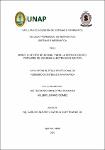Modelo de red neuronal para la predicción del consumo de energía eléctrica en Iquitos
Abstract
The main objective of this study was to evaluate the implementation of an artificial neural network model to improve the forecasting capacity of electricity consumption in the city of Iquitos. The methodology used in this research included the collection of historical data on electricity consumption in Iquitos, the implementation of an artificial neural network model, and the evaluation of the forecasting capacity of the model using statistical metrics such as the correlation coefficient and the error. mean square. The hypothesis of this research maintains that the implementation of an artificial neural network model will improve the forecasting capacity of electricity consumption in Iquitos, which will contribute to a more efficient management of electricity in the city. The results of this research indicate that the implementation of the artificial neural
network model allowed reaching a correlation coefficient higher than 0.95 and reducing the Mean Square Error in the prediction of electricity consumption by 5%. In conclusion, the implementation of an artificial neural network model can improve the forecasting capacity of electricity consumption in Iquitos, which contributes to a more efficient management of electricity in the city. These results are important for planning and decision-making on the supply and demand of electricity in Iquitos and can serve as a basis for future studies on the use of artificial neural networks in the management and forecasting of electricity consumption in other regions of the world. El objetivo principal de este estudio fue evaluar la implementación de un modelo de red neuronal artificial para mejorar la capacidad de pronóstico del consumo eléctrico en la ciudad de Iquitos. La metodología utilizada en esta investigación incluyó la recopilación de datos históricos sobre el consumo de electricidad en Iquitos, la implementación de un modelo de red neuronal artificial y la evaluación de la capacidad de pronóstico del modelo utilizando métricas estadísticas como el coeficiente de correlación y el error cuadrático medio. La hipótesis de esta investigación sostiene que la implementación de un modelo de red neuronal artificial permitirá mejorar la capacidad de pronóstico del consumo eléctrico en Iquitos, lo que contribuirá a una gestión más eficiente de la electricidad en la ciudad. Los resultados de esta investigación indican que la implementación del modelo de red neuronal artificial permitió alcanzar un coeficiente de correlación superior a 0,95 y reducir el Error Cuadrático Medio en la predicción del consumo eléctrico
en un 5%. En conclusión, la implementación de un modelo de red neuronal artificial puede mejorar la capacidad de pronóstico del consumo eléctrico en Iquitos, lo que contribuye a una gestión más eficiente de la electricidad en la ciudad. Estos resultados son importantes para la planificación y toma de decisiones sobre la oferta y la demanda de electricidad en Iquitos y pueden servir de base para futuros estudios sobre el uso de redes neuronales artificiales en la gestión y previsión del consumo eléctrico en otras regiones del mundo.
Collections
- Tesis [134]


